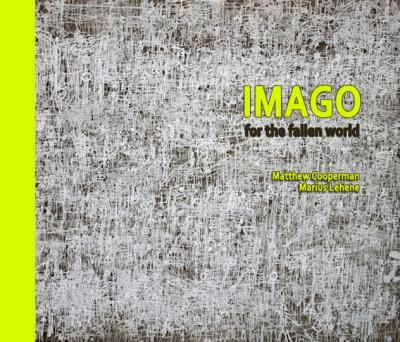THE FIGHT FOR IDEALISM IN IMAGO FOR THE FALLEN WORLD

by Matthew Cooperman and Maruis Lehene
Jaded Ibis Press
212 pages
reviewed by Brigit Kelly Young
In IMAGO for the fallen world, a new collection of poems by Matthew Cooperman with accompanying images by Marius Lehene, the reader is presented with several letters to the planet. These correspondences begin with “___ Planet,” reminding one that “Dear” may not yet have been earned by this world. Certainly, the speaker in Cooperman’s poems has been let down: “Utopia,” he writes, “is a virus I am anxious to be rid of.” Dismayed by era after era of unfulfilled hope, the poems’ speaker yearns to feel acceptance toward the inevitability of collapse. As Cooperman alternates between impassioned and drained (at one point observing, “A person is so much of breathing and shitting it’s a wonder we don’t exhaust ourselves getting up from the table”), the piece begins to feel like Ginsberg’s “Howl” for the Internet age; this world is a moral disaster, and the public has never been so informed about it, or so paralyzed. A potential activist spends his daily hours outraged by the tragedies re-told on multiple blogs, but by the time the urge to stand up and revolt arrives, the sun is already down and the rally over for the day. IMAGO, with its catalogued complaints and urgent pleas interspersed with frantic images, submerges the reader into the mind of the depleted idealist.
The poem “Still: Dollar” evokes the inane and cruel in daily American survival through lists of both stark realities and wry comebacks to an illusive, indefinable antagonist. One list that begins midway through the piece reads,
Complicity: paper towel usage in skanky back bathroom, desire for new
shoes at $4.50 an hour, $4.30 per gallon, six Styrofoam cups of coffee, already
a confession: was Starbucks, was PowerBar, was ipod download, was blood diamond, mutual funds, cigarette cravings
Lehene’s images accompany this mouse-click paced tour of modern finances—pictures of clown fish, dead fish, tents, cigarettes, and chairs, are stacked on top of one another like boxes. The reader is in a whirlwind of thought, of admission, moving as fast as the flashing screen of an action film. The effect of Lehene’s visual reflection of Cooperman’s work is to keep the reader slightly off-balance; the mind is not allowed a moment’s rest. This serves to suck one into the work like a vortex. The reader is bounced about between clear, written thought formations and the images, standing in for the ineffable thoughts that words cannot adequately address. The power of this combination of mediums serves to give authority to the poetic voice as it self-consciously attempts to conquer issues that at first may appear too overwhelming for it.
In the list following the aforementioned stanza, Cooperman simplifies the situation: “Cardboard: will write for food.” The humor here shrewdly cloaks the insight. Within this $4.50-an-hour, Starbucks-addicted society, a poet’s voice is necessary for its role in social criticism and artistic reprieve, but it is also at its most de-valued. Poetry begs on side streets, palms open for change. A poem like “Still: Dollar” may project a tone of resignation, but the poet will still be writing about its subjects as he starves. Almost unwittingly, IMAGO for the fallen world functions as a manifesto for a politically active conception of art.
It should be noted that Cooperman not only presents concerns of corporate takeover and war within a stream of flat statements, he also consistently interweaves the beauty of his lyricism. For example, within a poem in which Cooperman quotes Jesus, gives golems/Gollum a shout-out and a line (“Golem: precious, precious, the market loves war”), and lists the ratio of pay from CEO to worker in eight countries, Cooperman also writes an emotional tribute:
Condolence: your son or daughter committed suicide in the distress of war
and we salute you; your son or daughter is occupying a freezing public park
and we salute you
He later builds on this fervent voice and writes,
Chorus: conceived in desperation, born into a mess, we seem to be oblivious to the rotation of things in space, want more rambunction let us be less unctuous, stars and ideas, levitation in the hovering, people tell you who they are but we ignore it, love a flaw, we are flawed because we want so much
Cooperman’s lyric eloquence gives even more momentum to the fury with which he presents data and detail.
IMAGO for the fallen world marks a moment in time in which the progressive identity is fed up and acts of resistance often feel futile. Yet the work itself is ultimately resistant to hopelessness. Poetry and art become not only solace but also protest. Cooperman and Lehene take the reader into a collage of the mind of a poet in a broken world and what emerges is a sense of art’s importance in any upcoming repairs. IMAGO for the fallen world both documents and responds to the current sorrows of the early 21st century with inspiring originality.
Return to table of contents.
